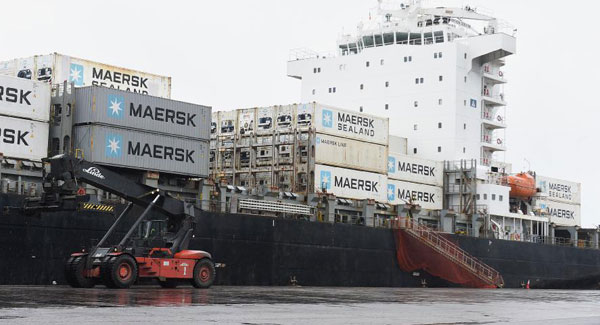Up to 40% of Ireland’s multi-billion-euro farming and fishing export markets are at risk in a worst-case Brexit fallout scenario, warns Agriculture Minister Michael Creed, writes Fiachra Ó Cionnaith.
He admitted there is “no upside” to British voters deciding in a referendum last June to leave the EU and that “until they put their cards on the table”, Ireland will remain in the dark on the likely impact in this country.
In advance of Brexit being officially triggered in March, Mr Creed told the Irish Examiner that the Government was working “very strategically” to limit the potential damage.
Echoing concerns from farming and fisheries groups, he said in a worst-case scenario, up to 40% of the sectors’ multibillion-euro export markets could be at risk.

“There is no upside to Brexit for the agri-food sector, but the message I would want to give is we are approaching this in a very strategic way,” said Mr Creed.
“We’ve done a lot of things in-house to mitigate the very worst excesses of the challenge and to see whether there might be any opportunities.
“We’re involved in detailed negotiations on a north-south basis with my equivalent in the North, Michelle McIlveen, and my UK equivalent, Andrea Leadsom, to try and negotiate the best possible deal we can for Irish agriculture.
“But the difficulty for us is 40% of our agri-food exports go to the UK.
“We also have virtually an all-Ireland economy when it comes to agri and fishery, which is really complicated — 38% by volume, 36% by value of Irish fish endeavour is caught in UK territorial waters.
“Put it like this: If the UK goes and decides to stand by article 50 [the clause triggering secession from the EU] negotiations that one of its primary objectives in the negotiations is to take lock, stock, and barrel of its territorial waters with it, that’s a real problem for us.”
Mr Creed outlined the situation as he stressed the Government was working “very strategically” on the Brexit issues in an attempt to limit damage to the Irish economy.
Mr Creed confirmed that, since the referendum on June 23, he has held direct meetings with the chief executives of Tesco and Sainsbury’s which, together, account for over €2bn of Irish agri-food exports per year to “cement” Ireland’s position in their stores.
In addition, Mr Creed said he has been reassured by Ms Leadsom that she wants to continue allowing Irish beef to be easily sold in Britain and is aware of the historically shared fishing traditions between the countries.
Asked if he had been given any guarantees over the issue and, specifically, if Ms Leadsom had ruled out seeking a deal with non-EU beef manufacturers which could push Irish products out of the market, Mr Creed said no such guarantee had been given.
“No, she didn’t [rule it out], and I think I need to be upfront and clear about all this. She’s not ruling out anything,” he said.
“The question is Mercosur, the South American trade deal with the EU — will the UK now do that by itself?
“That could have a significant adverse impact on us.”
Mr Creed’s worst-case scenario for the farming and fisheries sectors post-Brexit echo fears raised by interest groups over the fallout.
Earlier this year, Teagasc said the sectors stand to lose between €150m and €800m a year due to Brexit. The Irish Creamery Milk Suppliers Association said the vote is the biggest threat to the economy since the economic crash.
The comments came as the Leave Means Leave campaign in Britain said it has written to business groups across Europe asking them to put pressure on their governments for a free trade deal with the UK.
Lloyd’s Banking Group, it emerged, is planning to set up a European subsidiary to maintain access to the EU market.
This article first appeared in the Irish Examiner.


